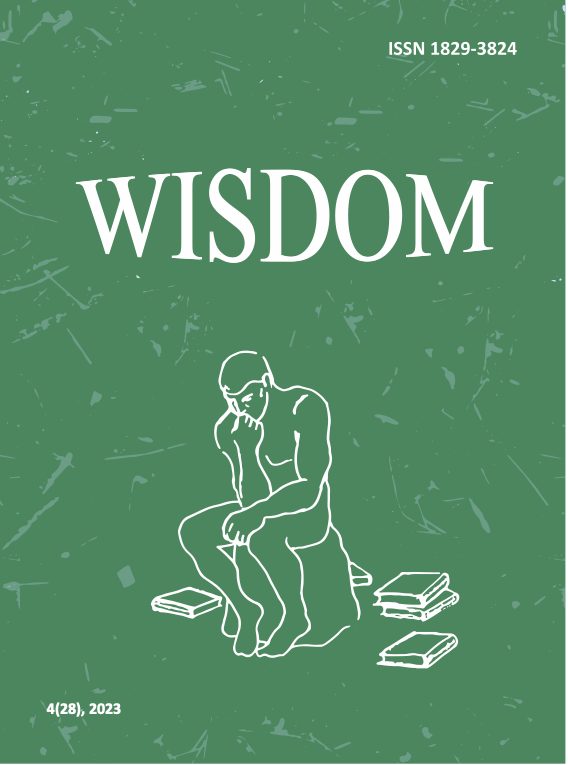Memes as the Phenomenon of Modern Digital Culture
DOI:
https://doi.org/10.24234/wisdom.v15i2.361Keywords:
Internet meme, digital culture, Web 2.0, Web 3.0, social media, intellectual practices, artistic practices, information product, communicationAbstract
The article analyzes an Internet meme as the newest information product of the society and a result of its intellectual and artistic practices. The analysis of the role of the Internet memes, created by means of the popular artistic images modification in the modern digital culture is made. Such methods as semiotic and hermeneutic analysis of the Internet memes are used in the research work. The authors seek to explore the reasons for the popularity of memes in the processes of symbolic production and exchange in contemporary society and the modern digital culture, which is the purpose of this study. We consider that Internet meme created by using and modifying artistic images is a new phenomenon in human public life and new type of communication. As a hypothesis, a distinctive feature of the Internet meme is the surprise and laughter it causes in the “man of the Internet”. The main result of this article is the analysis the role of Internet memes in the newest information space and their specific features as a special information product of the modern digital culture. The authors draw attention to the popularity of Internet memes caused by an increase in information chaos in the modern symbolic production and exchange and, therefore, a person’s confusion when meeting a large number of information.
Downloads
References
Bansal, G., Zahedi, F. M., & Gefen, D. (2016). Do Context and Personality Matter? Trust and Pri-vacy Concerns in Disclosing Private Information Online. Information and Management, 53(1), 1-21. doi.org/10.1016/j.im.2015.08.001
Bente, G., Rüggenberg, S., Krämer, N. C., & Eschenburg, F. (2008). Avatar?Mediated Networking: Increasing Social Presence and Interpersonal Trust in Net?Based Collaborations. Human Communication Research, 34(2), 287-318. doi/10.1111/j.1468-2958.2008.00322.x
Berthon, P. R., Pitt, L. F., Plangger, K., & Shapiro, D. (2012). Marketing Meets Web 2.0, Social Media, and Creative Consumers: Implications for International Marketing Strategy. Busi-ness Horizons, 55(3), 261-271. doi:10.1016/j.bushor.2012.01.007
Cannizzaro, S. (2016). Internet Memes as Internetsigns: A Semiotic View of Digitalculture. Sign Systems Studies, 44(4), 562–586. doi:10.12697/SSS.2016.44.4.05
Castaño, D., C. M. (2013). Defining and Characterizing the Concept of Internet Meme. Revista CES Psicologia, 6(2), 82-104.
Castells, M. (1999). Information Technology, Globalization and Social Development. United Nations Research Institute for Social Development.
Castells, M. (2001). The Internet Galaxy. Reflections on the Internet, Business, and Society. Oxford University Press.
Friendly, M., & Denis, D. (2005). Milestones in the History of Thematic Cartography, Statistical Graphics and Data Visualization. New York: Springer.
Hakobyan, A. (2020). Theory Digitalization of Communication and the Spiral of Silence. Wisdom, 1(14), 19-27. doi:10.24234/wisdom.v14i1.312
Harris, C. R., & Lester, P. M. (2002). Visual Journalism: A Guide for New Media Professionals. Boston: Allyn and Bacon.
Hermann, ?, Pentek, T., & Otto, B. (2015). Design Principles for Industrie 4.0. Scenarios: A Litera-ture Review, Working Paper. Technische Universität Dortmund.
Kagermann, H., Lukas, W.-D., & Wahlster, W. (2011, April). Industrie 4.0: Mit dem Internet der Dinge auf dem Weg zur 4. Industriellen Revolution. VDI nachrichten -1, 13.
Kagermann, H., Wahlster, W., & Helbig, J. (2013). Securing the Future of German Manufacturing Industry: Recommendations for Implementing the Strategic Initiative Industrie 4.0: Final re-port of the Industrie 4.0 Working Group. National Academy and Engineering.
Labuz, R. (1991). Contemporary Graphic Design. New York: Van Nostrand Reinhold.
Perer, A. (2010). Visualizing Social Networks. In J. Steele & N. Iliinsky (Eds), Beautiful Visualiza-tion: Looking at Data through the Eyes of Experts (pp. 157-160). Sebastopol, CA: O’Reilly Media.
Piccarozzi, M., Aquilani, B., & Gatti, C. (2018). Industry 4.0 in Management Studies: A Systematic Literature Review. Sustainability, 10(10), 3821, 2-24. doi.org/10.3390/su10103821
van der Werff, L., Real, C., & Lynn, T. (2018). Individual Trust and the Internet. In R. Searle, A. Nienaber, & S. Sitkin (Eds.), Trust (pp. 3-6). Oxford, UK: Routledge.
Vries, L. de. (1968). Victorian Advertisements. London: William Clowes and Sons Limited.
Downloads
Published
How to Cite
Issue
Section
License
Copyright (c) 2020 WISDOM

This work is licensed under a Creative Commons Attribution-NonCommercial 4.0 International License.
Creative Commons Attribution-Non-Commercial (CC BY-NC). CC BY-NC allows users to copy and distribute the article, provided this is not done for commercial purposes. The users may adapt – remix, transform, and build upon the material giving appropriate credit, and providing a link to the license. The full details of the license are available at https://creativecommons.org/licenses/by-nc/4.0/.















